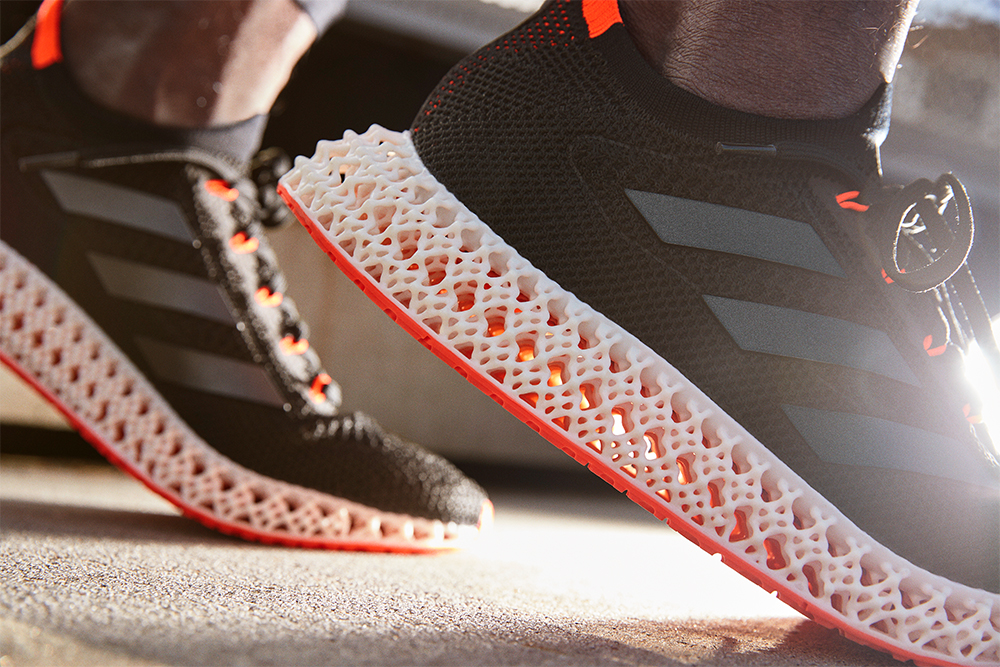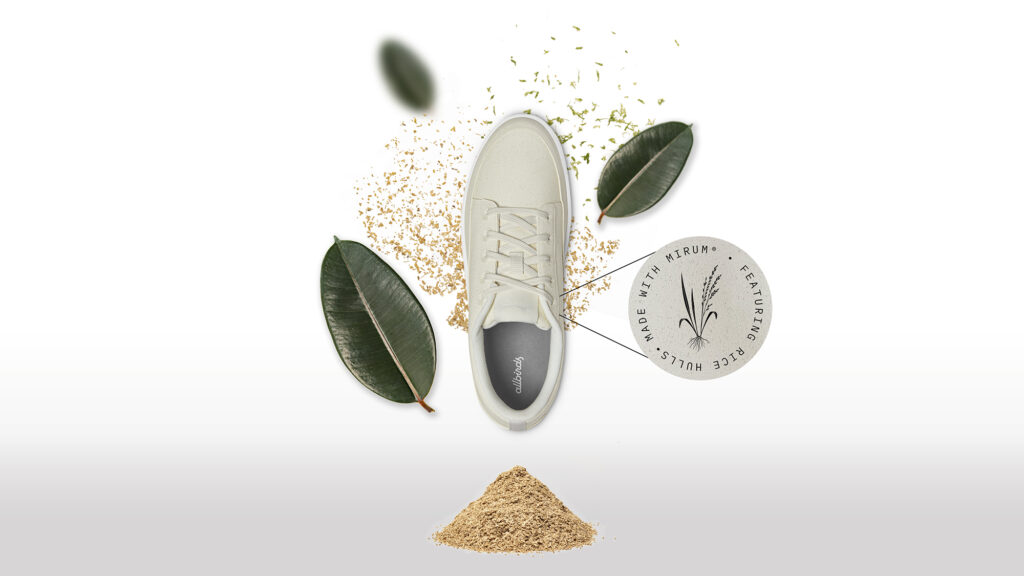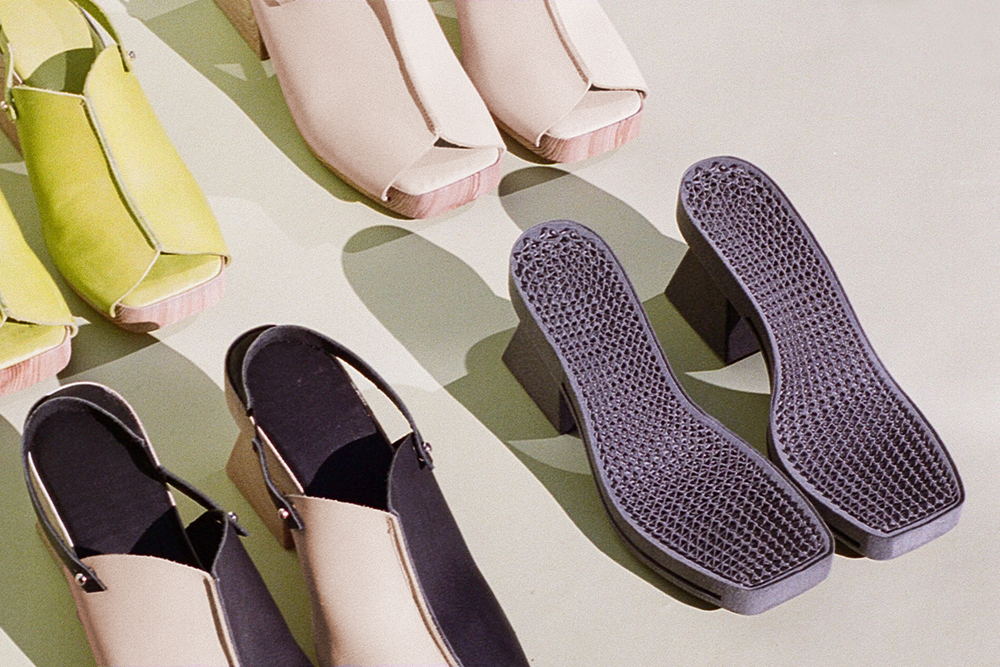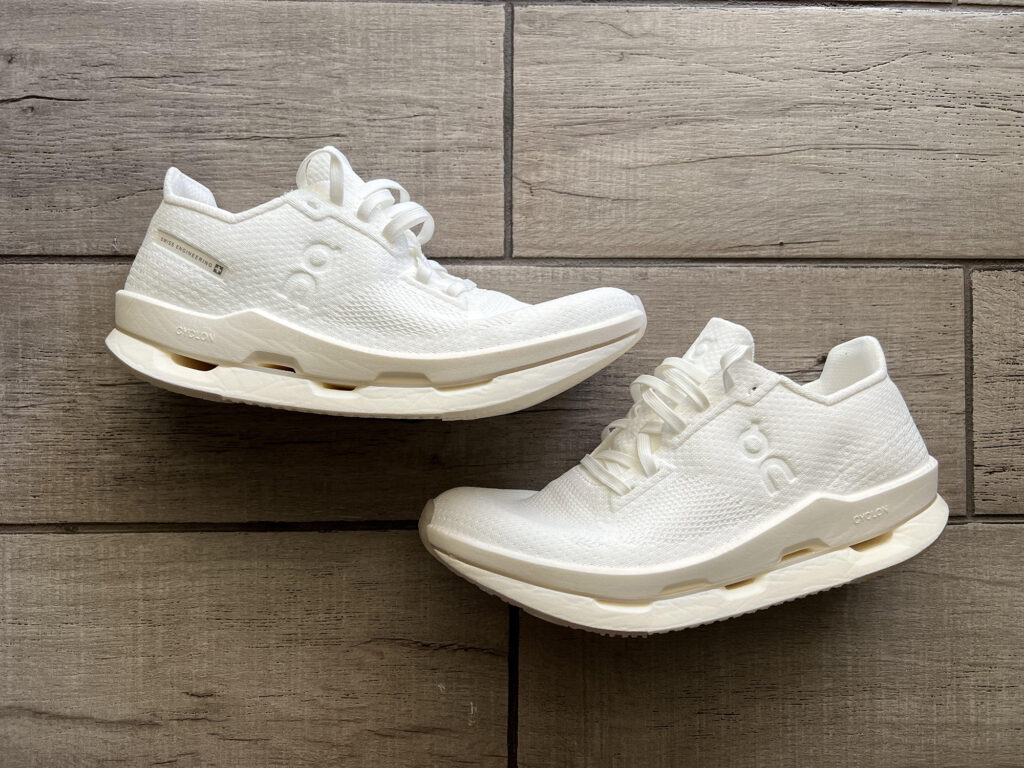When Nike launched its Flyknit trainer in 2012, it kickstarted a new era in sustainable footwear. The one-piece uppers, knit on a flat machine, created 60 percent less waste than traditional construction. The transition to recycled polyester (rPET) yarns in 2016 added to the brand’s sustainability cred. Adidas followed quickly with their Primeknit styles and in 2015 introduced a partnership with Parley for the Oceans, intercepting plastic waste on beaches and coastlines and turning it into rPET for shoes and apparel.

A decade later, sustainable sneakers from premium brands are front and center, worn by celebrities, sneaker heads, and cool kids everywhere. “Sustainable footwear is on the rise, due to the development of startups, engaged initiatives by premium companies, and permeation into footwear by sustainability players,” says a report by Future Market Insights.
The cool factor
There’s no question that consumers are increasingly aware of sustainability in their sneakers. VEJA, a French brand “made differently” in Brazil, and Allbirds, the first with transparent carbon accounting, have garnered high marks. Both are certified B Corporations. On The VEJA Project website, the company explains, “We decided to make sneakers because this product symbolizes our generation and our era. It’s also a product that crystallizes the major issues of globalization through its production, dissemination, and usage.”
Veja works with Fairtrade-sourced, organic cotton from Brazil and Peru, natural Amazonian chrome-free leather, bio-based leather, and latex-based foam. The focus is on partnerships with suppliers and employees, combining social projects and economic justice with ecological materials. According to the company, this means Veja sneakers cost five times more to manufacture than big brand sneakers.
Eschewing advertising and marketing, the company’s focus on sustainability, transparency and social responsibility has resonated with consumers. Headquartered in San Francisco, Allbirds began as a DTC brand. The company found success with simple, comfortable styles and natural materials such as merino wool, eucalyptus fiber, and sugar cane SweetFoam. Allbirds was the first fashion brand to label its products with their carbon footprints. After collaborating with adidas on a low-carbon performance shoe in 2020, Allbirds developed the M0.0NSHOT, a shoe with a carbon footprint of 0.0 kg CO2e, achieved without relying on offsets.
The Moonshot uppers are made with regenerative New Zealand merino wool, and the shoe features the brand’s new, sugarcane-based SuperLight Foam, along with bioplastic eyelets made with products from Mango Materials. Moonshot was unveiled at the June Global Fashion Summit in Copenhagen.

Keeping footwear out of landfills
The Future Market Insights report points out that footwear accounts for 20 percent of the apparel industry’s environmental impact, generating 700 million metric tons of CO2 as an annual byproduct of production and raw materials. According to a survey published by footwear brand Vivobarefoot, an estimated 22 billion pairs of shoes end up in landfills each year, taking an average of 30 to 40 years to decompose.
Footwear brands are jumping into takeback, repair and recycling programs to keep footwear out of the landfills and designing circularity into their product from the outset. For example:
- On Running’s circular Cyclon™ subscription program is built around the Swiss company’s Cloudneo shoe, made from castor beans. The shoe is designed to last about six months, then returned to the company to be ground down and recycled. Subscribers are then sent a new pair.
- Salomon’s Index0.2 running shoe is designed to be easily disassembled, with a non-toxic, nitrogen-infused TPU (thermoplastic polyurethane) midsole foam. A QR code registers the shoe, allowing the consumer to return it to Salomon for recycling. Salomon disassembles the shoes and reuses the materials in its Alpine ski boots.
- Thousand Fell’s sneakers are made from recyclable materials such as sugar cane, coconut husks, castor beans, aloe vera, recycled rubber, and rPET, and can be returned for recycling through SuperCircle, which provides credit towards the next Thousand Fell purchase.
- Newcomer Zerofly™ has been launched on Kickstarter by Berlin-based Winq Sports. The running shoe is composed of bio-based and recycled materials, including rPET, eucalyptus fiber, algae, castor beans, and Michelin hybrid rubber. The shoes are intended to be sent back to partner Sneaker Rescue to be responsibly repaired or recycled. The remaining carbon footprint is offset through NGO myclimate.
- Veja has opened sites in Bordeaux, Paris and Berlin, where it will repair and recycle its sneakers. The brand also sells samples and dead stock.

Purposeful design with sustainable materials
With performance and durability front and center, footwear manufacturers have historically utilized an unrecoverable mash-up of materials, including a number of fossil fuel-based synthetic fibers, foams and glues that can take 1000 years to break down. Searching for sustainable alternatives, labs at ingredient brands are busy brewing bio-based and non-toxic materials in collaboration with footwear brands and manufacturers.
Based in Illinois, Natural Fiber Welding (NFW) is developing a collection of bio-neutral materials for footwear and apparel. Alan Lugo, NFW’s product strategy manager, describes “bio-neutral” as things that can return to the earth without harm. “Materials that biodegrade quickly but ignore other important factors are not always the best solution,” he explains. “Our approach is no plastics, no toxins.”
Among NFW’s innovations for footwear are MIRUM®, a plant-based, plastic-free leather alternative; PLIANT™, a sustainably sourced natural rubber for outsoles molded with plant-based curatives; and TUNERA™, a bio-neutral alternative to PVA and TPU foams.

Developing these new materials requires a balance of sustainability, performance and price, according to Lugo. “We take the challenge very seriously. The industry likes to say ‘no compromise,’ but we will not compromise on sustainability.”
Allbirds invested $2 million in NFW early in 2021, and in 2022 introduced its Plant Pacer sneaker made with Mirium Plant Leather. NFW also partners with sustainable brands Stella McCartney, Reformation and Pangaia.
A familiar name in the footwear industry, OrthoLite® is the world’s leading supplier of open cell foam technology found in more than 600 million shoes across all categories each year. In 2022 the Mass.-based company announced a sustainable midsole innovation called OrthoLite Cirql™, the first traditional plastic-free, recyclable, biodegradable and industrially compostable foam with an end-of-life solution.
Still in the trial stage, the product uses a biopolymer created by Italian company Novamont Research, derived from non-GMO vegetable raw materials plus synthetic biodegradable materials. OrthoLite Cirql’s chemical-free foaming process uses nitrogen combined with renewable energy. The material can be returned to the production cycle by low-energy, advanced chemical recycling, or be fully composted through industrial composting methods and processors.
Performance remains critically important, the company insists. “The reality is that most consumers will not sacrifice performance for sustainability. OrthoLite Cirql is third-party tested to validate our claims that this new innovation is a viable replacement to traditional plastic foams that use toxic or hazardous chemicals,” says chief sales officer C.B. Tuite. “OrthoLite Cirql offers the solution of a plant-based biopolymer, chemical-free foaming, waste-free production, and fully biodegradable microplastics. OrthoLite Cirql’s two-part innovation, utilizing new materials and a patented, chemical-free foaming process, is what makes the end goal of circularity possible.”
Also well-established in the footwear industry is Arkema’s Pebax®, a family of thermoplastic elastomers found in high-performance footwear such as sports shoes and ski boots. The international chemical company’s U.S. base is in Pennsylvania. The company’s Pebax Rnew® is sustainably sourced from castor beans, which absorb CO2 from the atmosphere during the growth cycle. The polymer is finding a home in sustainable footwear such as Mizuno’s Wave Rider 24 shoe, On Running’s CloudNeo Cyclon and the upcoming Winq Zerofly.
Changing the footwear game
The global market for sustainable footwear is anticipated to grow at a CAGR of 6 percent in the next decade, and reach a valuation of US$ 17.18 billion, according to the Future Markets Insight report. NFW’s Lugo views the current paradigm shift to sustainable footwear as “a perfect storm of consumer concern, government legislation, advocacy organizations and the work of material suppliers.”
OrthoLite’s Tuite agrees, “Consumers, brands, and the factories that manufacture footwear have all been demanding change in order to reduce the pollution, the waste and the use of toxic chemicals in our footwear.”
Beyond sports shoes, casual and outdoor footwear brands are also sporting sustainability credentials. For the moment, however, sneakers rule the space.
Debra Cobb is a freelance writer with expertise in the textiles industry and a frequent contributor to Textile Technology Source. She is based in North Carolina.
 TEXTILES.ORG
TEXTILES.ORG


